Case Study: Legal and Ethical Issues in Employment (Martin Marietta)
VerifiedAdded on 2022/08/25
|8
|2211
|29
Case Study
AI Summary
This assignment analyzes the landmark case of Martin Marietta Corp. v. Lorenz, focusing on the legal doctrine of at-will employment and its exceptions. The student summarizes the facts, including Lorenz's role, the disputes with his employer, and his termination. The analysis then delves into ethical perspectives, applying utilitarian and Kantian ethical theories to assess the actions of the parties involved. The paper examines the rights and responsibilities of both the plaintiff and the defendant, highlighting ethical principles to avoid litigation. Finally, the assignment evaluates how the application of Regis/Jesuit core values could have potentially resolved the dispute, offering a comprehensive overview of the legal and ethical dimensions of the case.
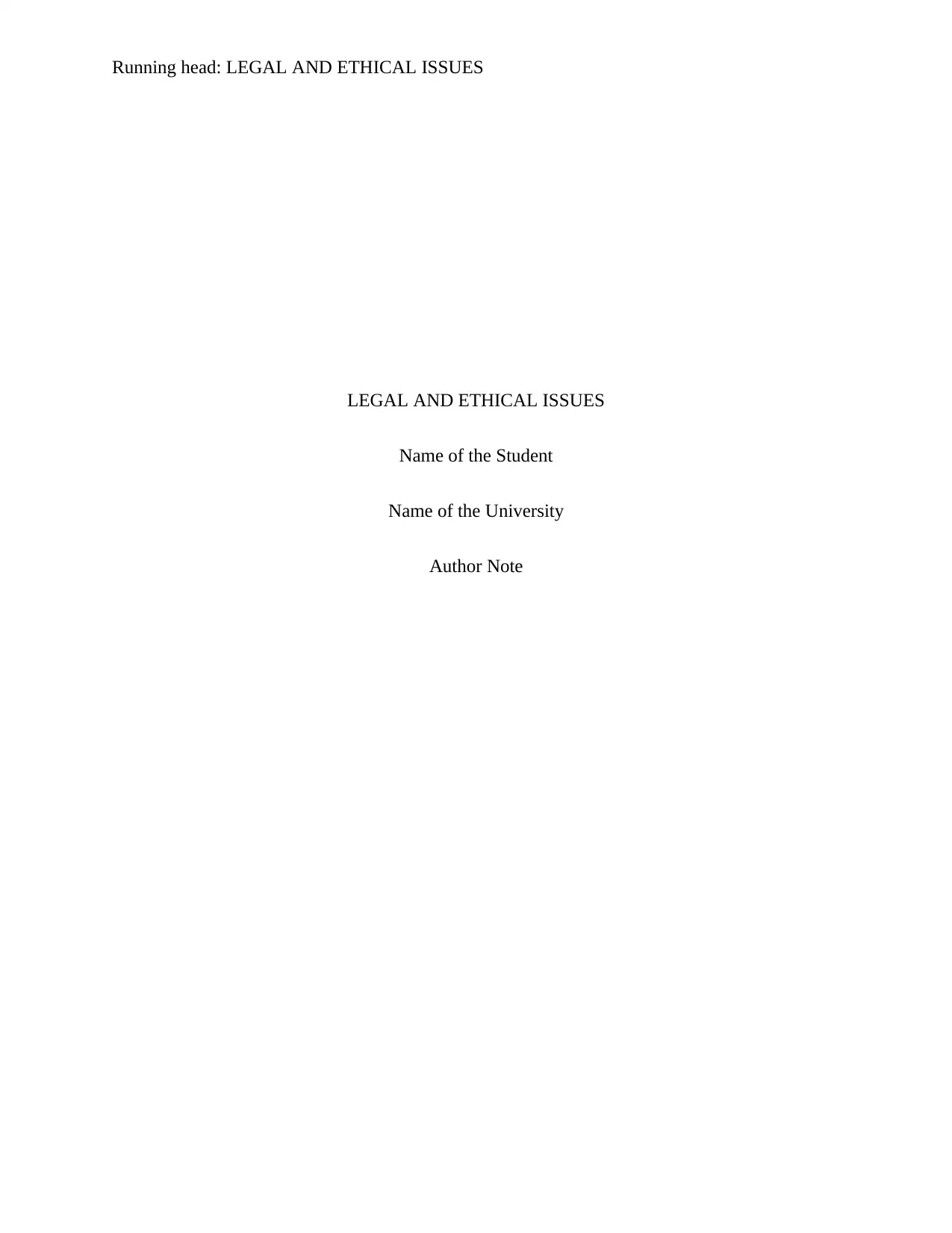
Running head: LEGAL AND ETHICAL ISSUES
LEGAL AND ETHICAL ISSUES
Name of the Student
Name of the University
Author Note
LEGAL AND ETHICAL ISSUES
Name of the Student
Name of the University
Author Note
Paraphrase This Document
Need a fresh take? Get an instant paraphrase of this document with our AI Paraphraser
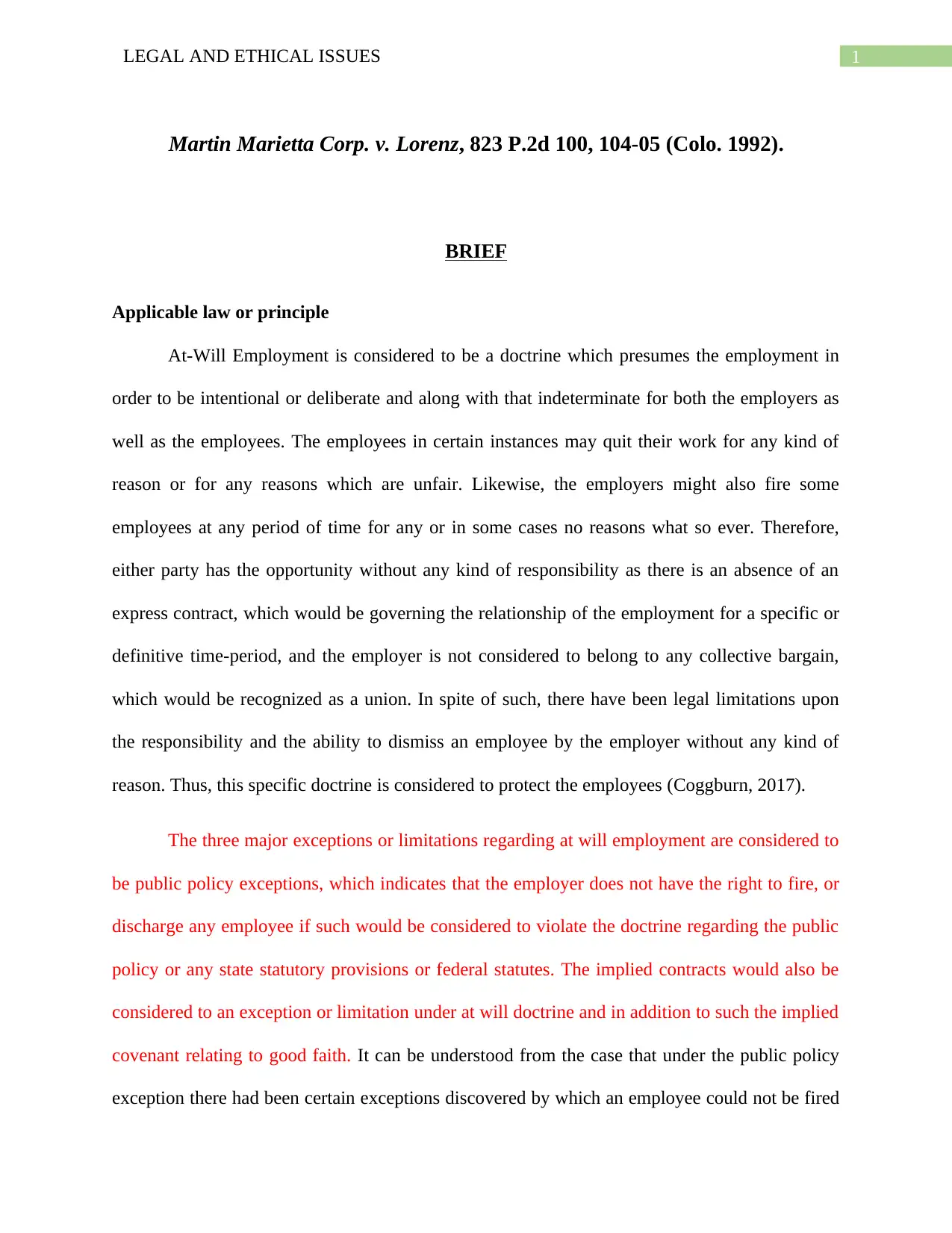
1LEGAL AND ETHICAL ISSUES
Martin Marietta Corp. v. Lorenz, 823 P.2d 100, 104-05 (Colo. 1992).
BRIEF
Applicable law or principle
At-Will Employment is considered to be a doctrine which presumes the employment in
order to be intentional or deliberate and along with that indeterminate for both the employers as
well as the employees. The employees in certain instances may quit their work for any kind of
reason or for any reasons which are unfair. Likewise, the employers might also fire some
employees at any period of time for any or in some cases no reasons what so ever. Therefore,
either party has the opportunity without any kind of responsibility as there is an absence of an
express contract, which would be governing the relationship of the employment for a specific or
definitive time-period, and the employer is not considered to belong to any collective bargain,
which would be recognized as a union. In spite of such, there have been legal limitations upon
the responsibility and the ability to dismiss an employee by the employer without any kind of
reason. Thus, this specific doctrine is considered to protect the employees (Coggburn, 2017).
The three major exceptions or limitations regarding at will employment are considered to
be public policy exceptions, which indicates that the employer does not have the right to fire, or
discharge any employee if such would be considered to violate the doctrine regarding the public
policy or any state statutory provisions or federal statutes. The implied contracts would also be
considered to an exception or limitation under at will doctrine and in addition to such the implied
covenant relating to good faith. It can be understood from the case that under the public policy
exception there had been certain exceptions discovered by which an employee could not be fired
Martin Marietta Corp. v. Lorenz, 823 P.2d 100, 104-05 (Colo. 1992).
BRIEF
Applicable law or principle
At-Will Employment is considered to be a doctrine which presumes the employment in
order to be intentional or deliberate and along with that indeterminate for both the employers as
well as the employees. The employees in certain instances may quit their work for any kind of
reason or for any reasons which are unfair. Likewise, the employers might also fire some
employees at any period of time for any or in some cases no reasons what so ever. Therefore,
either party has the opportunity without any kind of responsibility as there is an absence of an
express contract, which would be governing the relationship of the employment for a specific or
definitive time-period, and the employer is not considered to belong to any collective bargain,
which would be recognized as a union. In spite of such, there have been legal limitations upon
the responsibility and the ability to dismiss an employee by the employer without any kind of
reason. Thus, this specific doctrine is considered to protect the employees (Coggburn, 2017).
The three major exceptions or limitations regarding at will employment are considered to
be public policy exceptions, which indicates that the employer does not have the right to fire, or
discharge any employee if such would be considered to violate the doctrine regarding the public
policy or any state statutory provisions or federal statutes. The implied contracts would also be
considered to an exception or limitation under at will doctrine and in addition to such the implied
covenant relating to good faith. It can be understood from the case that under the public policy
exception there had been certain exceptions discovered by which an employee could not be fired
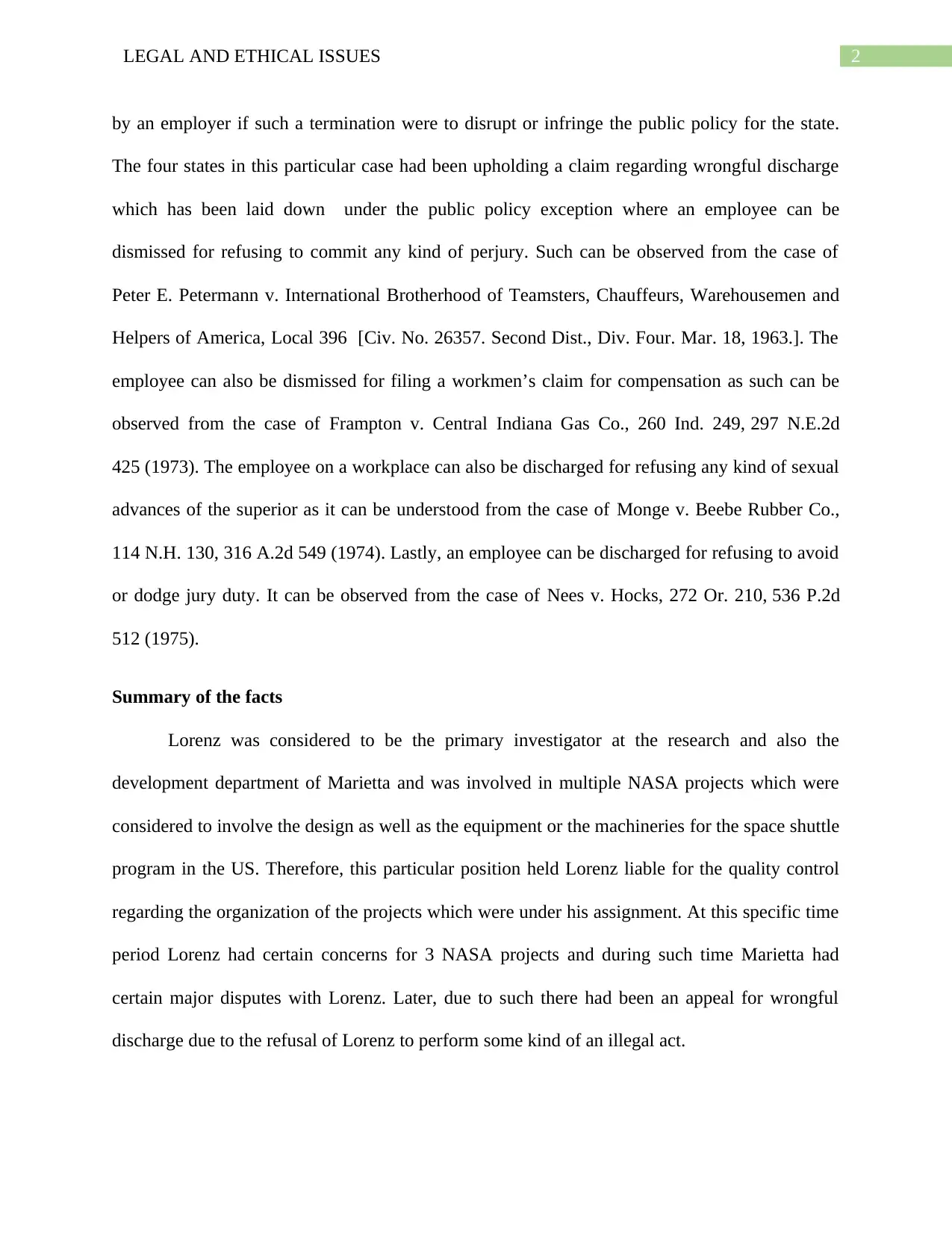
2LEGAL AND ETHICAL ISSUES
by an employer if such a termination were to disrupt or infringe the public policy for the state.
The four states in this particular case had been upholding a claim regarding wrongful discharge
which has been laid down under the public policy exception where an employee can be
dismissed for refusing to commit any kind of perjury. Such can be observed from the case of
Peter E. Petermann v. International Brotherhood of Teamsters, Chauffeurs, Warehousemen and
Helpers of America, Local 396 [Civ. No. 26357. Second Dist., Div. Four. Mar. 18, 1963.]. The
employee can also be dismissed for filing a workmen’s claim for compensation as such can be
observed from the case of Frampton v. Central Indiana Gas Co., 260 Ind. 249, 297 N.E.2d
425 (1973). The employee on a workplace can also be discharged for refusing any kind of sexual
advances of the superior as it can be understood from the case of Monge v. Beebe Rubber Co.,
114 N.H. 130, 316 A.2d 549 (1974). Lastly, an employee can be discharged for refusing to avoid
or dodge jury duty. It can be observed from the case of Nees v. Hocks, 272 Or. 210, 536 P.2d
512 (1975).
Summary of the facts
Lorenz was considered to be the primary investigator at the research and also the
development department of Marietta and was involved in multiple NASA projects which were
considered to involve the design as well as the equipment or the machineries for the space shuttle
program in the US. Therefore, this particular position held Lorenz liable for the quality control
regarding the organization of the projects which were under his assignment. At this specific time
period Lorenz had certain concerns for 3 NASA projects and during such time Marietta had
certain major disputes with Lorenz. Later, due to such there had been an appeal for wrongful
discharge due to the refusal of Lorenz to perform some kind of an illegal act.
by an employer if such a termination were to disrupt or infringe the public policy for the state.
The four states in this particular case had been upholding a claim regarding wrongful discharge
which has been laid down under the public policy exception where an employee can be
dismissed for refusing to commit any kind of perjury. Such can be observed from the case of
Peter E. Petermann v. International Brotherhood of Teamsters, Chauffeurs, Warehousemen and
Helpers of America, Local 396 [Civ. No. 26357. Second Dist., Div. Four. Mar. 18, 1963.]. The
employee can also be dismissed for filing a workmen’s claim for compensation as such can be
observed from the case of Frampton v. Central Indiana Gas Co., 260 Ind. 249, 297 N.E.2d
425 (1973). The employee on a workplace can also be discharged for refusing any kind of sexual
advances of the superior as it can be understood from the case of Monge v. Beebe Rubber Co.,
114 N.H. 130, 316 A.2d 549 (1974). Lastly, an employee can be discharged for refusing to avoid
or dodge jury duty. It can be observed from the case of Nees v. Hocks, 272 Or. 210, 536 P.2d
512 (1975).
Summary of the facts
Lorenz was considered to be the primary investigator at the research and also the
development department of Marietta and was involved in multiple NASA projects which were
considered to involve the design as well as the equipment or the machineries for the space shuttle
program in the US. Therefore, this particular position held Lorenz liable for the quality control
regarding the organization of the projects which were under his assignment. At this specific time
period Lorenz had certain concerns for 3 NASA projects and during such time Marietta had
certain major disputes with Lorenz. Later, due to such there had been an appeal for wrongful
discharge due to the refusal of Lorenz to perform some kind of an illegal act.
⊘ This is a preview!⊘
Do you want full access?
Subscribe today to unlock all pages.

Trusted by 1+ million students worldwide
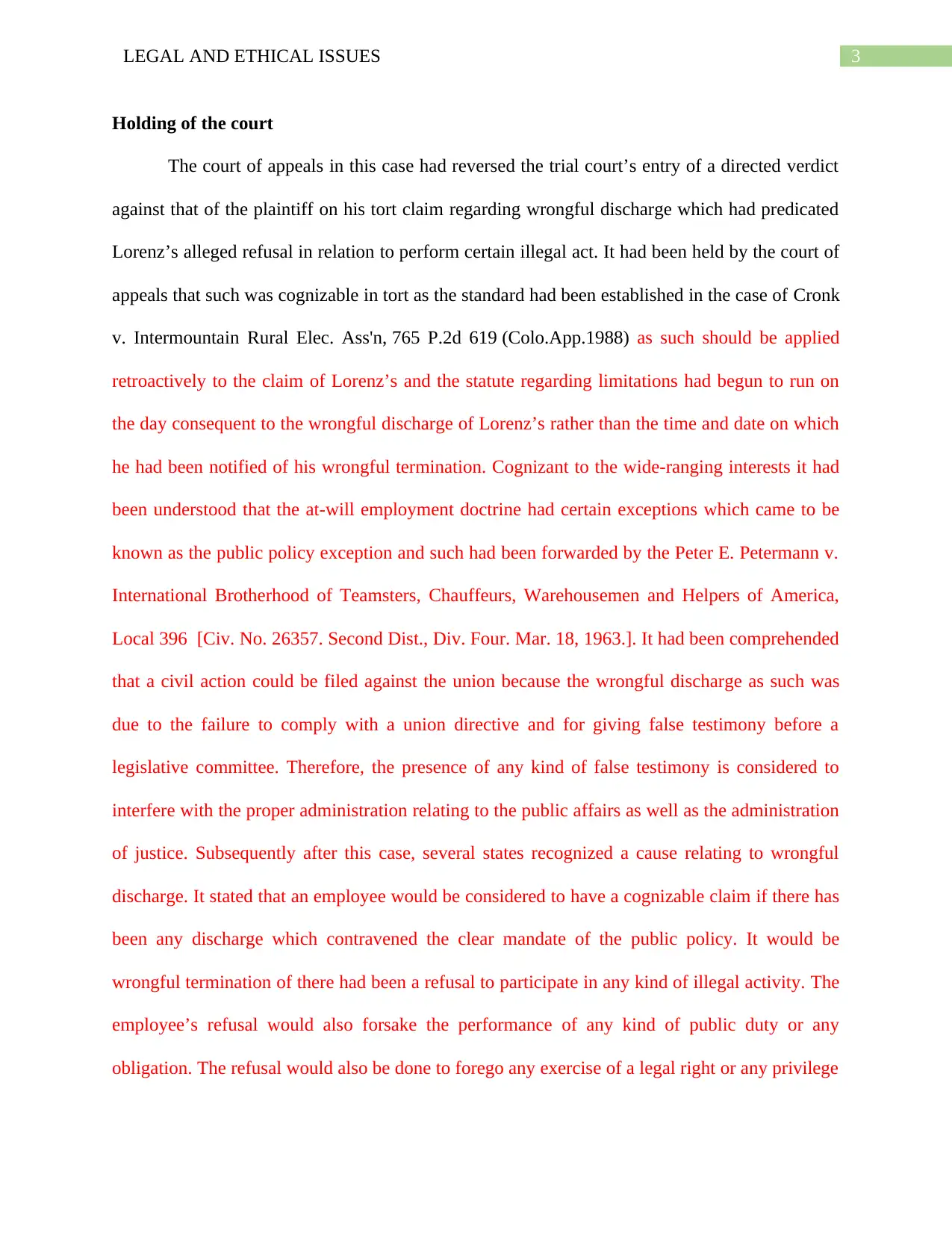
3LEGAL AND ETHICAL ISSUES
Holding of the court
The court of appeals in this case had reversed the trial court’s entry of a directed verdict
against that of the plaintiff on his tort claim regarding wrongful discharge which had predicated
Lorenz’s alleged refusal in relation to perform certain illegal act. It had been held by the court of
appeals that such was cognizable in tort as the standard had been established in the case of Cronk
v. Intermountain Rural Elec. Ass'n, 765 P.2d 619 (Colo.App.1988) as such should be applied
retroactively to the claim of Lorenz’s and the statute regarding limitations had begun to run on
the day consequent to the wrongful discharge of Lorenz’s rather than the time and date on which
he had been notified of his wrongful termination. Cognizant to the wide-ranging interests it had
been understood that the at-will employment doctrine had certain exceptions which came to be
known as the public policy exception and such had been forwarded by the Peter E. Petermann v.
International Brotherhood of Teamsters, Chauffeurs, Warehousemen and Helpers of America,
Local 396 [Civ. No. 26357. Second Dist., Div. Four. Mar. 18, 1963.]. It had been comprehended
that a civil action could be filed against the union because the wrongful discharge as such was
due to the failure to comply with a union directive and for giving false testimony before a
legislative committee. Therefore, the presence of any kind of false testimony is considered to
interfere with the proper administration relating to the public affairs as well as the administration
of justice. Subsequently after this case, several states recognized a cause relating to wrongful
discharge. It stated that an employee would be considered to have a cognizable claim if there has
been any discharge which contravened the clear mandate of the public policy. It would be
wrongful termination of there had been a refusal to participate in any kind of illegal activity. The
employee’s refusal would also forsake the performance of any kind of public duty or any
obligation. The refusal would also be done to forego any exercise of a legal right or any privilege
Holding of the court
The court of appeals in this case had reversed the trial court’s entry of a directed verdict
against that of the plaintiff on his tort claim regarding wrongful discharge which had predicated
Lorenz’s alleged refusal in relation to perform certain illegal act. It had been held by the court of
appeals that such was cognizable in tort as the standard had been established in the case of Cronk
v. Intermountain Rural Elec. Ass'n, 765 P.2d 619 (Colo.App.1988) as such should be applied
retroactively to the claim of Lorenz’s and the statute regarding limitations had begun to run on
the day consequent to the wrongful discharge of Lorenz’s rather than the time and date on which
he had been notified of his wrongful termination. Cognizant to the wide-ranging interests it had
been understood that the at-will employment doctrine had certain exceptions which came to be
known as the public policy exception and such had been forwarded by the Peter E. Petermann v.
International Brotherhood of Teamsters, Chauffeurs, Warehousemen and Helpers of America,
Local 396 [Civ. No. 26357. Second Dist., Div. Four. Mar. 18, 1963.]. It had been comprehended
that a civil action could be filed against the union because the wrongful discharge as such was
due to the failure to comply with a union directive and for giving false testimony before a
legislative committee. Therefore, the presence of any kind of false testimony is considered to
interfere with the proper administration relating to the public affairs as well as the administration
of justice. Subsequently after this case, several states recognized a cause relating to wrongful
discharge. It stated that an employee would be considered to have a cognizable claim if there has
been any discharge which contravened the clear mandate of the public policy. It would be
wrongful termination of there had been a refusal to participate in any kind of illegal activity. The
employee’s refusal would also forsake the performance of any kind of public duty or any
obligation. The refusal would also be done to forego any exercise of a legal right or any privilege
Paraphrase This Document
Need a fresh take? Get an instant paraphrase of this document with our AI Paraphraser
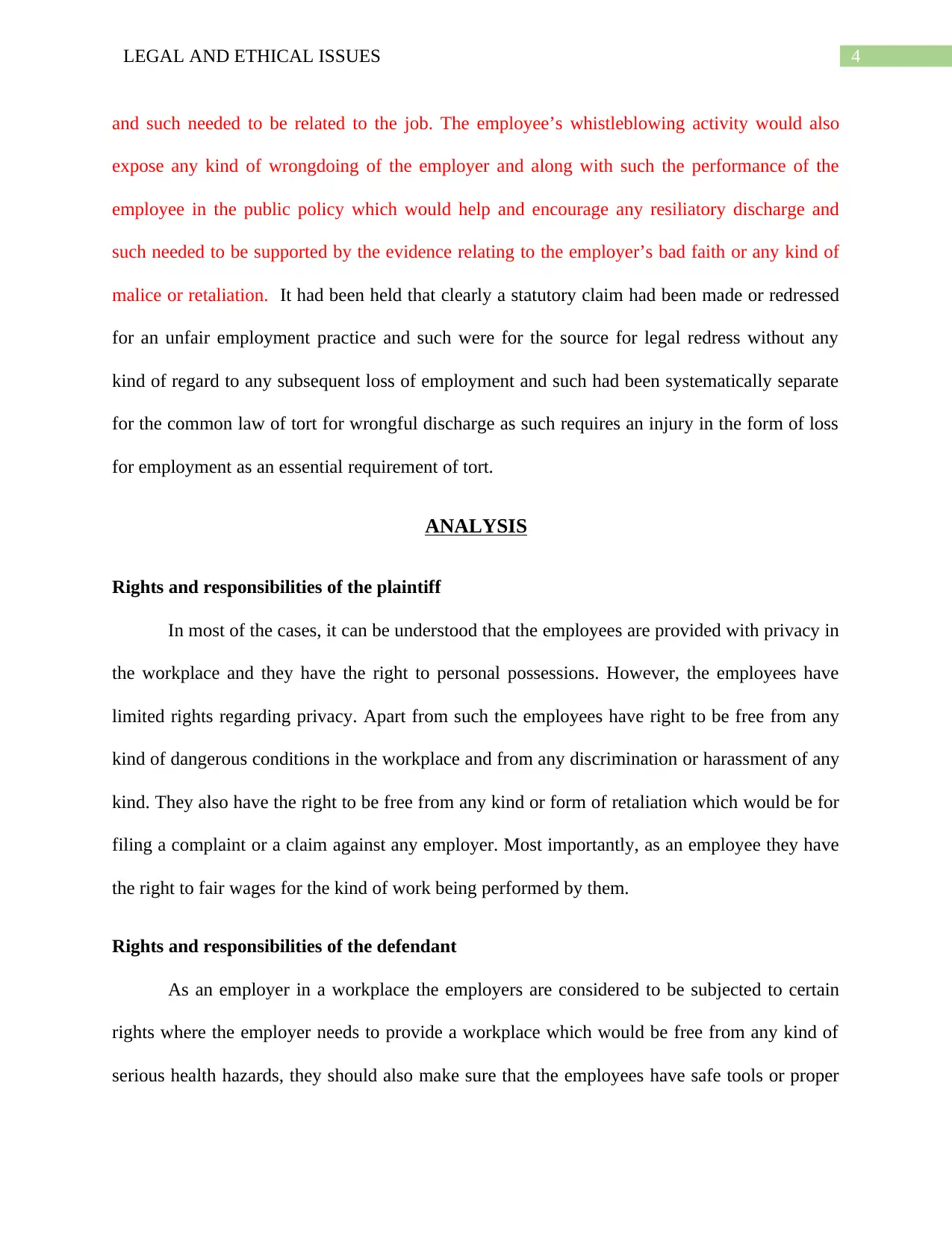
4LEGAL AND ETHICAL ISSUES
and such needed to be related to the job. The employee’s whistleblowing activity would also
expose any kind of wrongdoing of the employer and along with such the performance of the
employee in the public policy which would help and encourage any resiliatory discharge and
such needed to be supported by the evidence relating to the employer’s bad faith or any kind of
malice or retaliation. It had been held that clearly a statutory claim had been made or redressed
for an unfair employment practice and such were for the source for legal redress without any
kind of regard to any subsequent loss of employment and such had been systematically separate
for the common law of tort for wrongful discharge as such requires an injury in the form of loss
for employment as an essential requirement of tort.
ANALYSIS
Rights and responsibilities of the plaintiff
In most of the cases, it can be understood that the employees are provided with privacy in
the workplace and they have the right to personal possessions. However, the employees have
limited rights regarding privacy. Apart from such the employees have right to be free from any
kind of dangerous conditions in the workplace and from any discrimination or harassment of any
kind. They also have the right to be free from any kind or form of retaliation which would be for
filing a complaint or a claim against any employer. Most importantly, as an employee they have
the right to fair wages for the kind of work being performed by them.
Rights and responsibilities of the defendant
As an employer in a workplace the employers are considered to be subjected to certain
rights where the employer needs to provide a workplace which would be free from any kind of
serious health hazards, they should also make sure that the employees have safe tools or proper
and such needed to be related to the job. The employee’s whistleblowing activity would also
expose any kind of wrongdoing of the employer and along with such the performance of the
employee in the public policy which would help and encourage any resiliatory discharge and
such needed to be supported by the evidence relating to the employer’s bad faith or any kind of
malice or retaliation. It had been held that clearly a statutory claim had been made or redressed
for an unfair employment practice and such were for the source for legal redress without any
kind of regard to any subsequent loss of employment and such had been systematically separate
for the common law of tort for wrongful discharge as such requires an injury in the form of loss
for employment as an essential requirement of tort.
ANALYSIS
Rights and responsibilities of the plaintiff
In most of the cases, it can be understood that the employees are provided with privacy in
the workplace and they have the right to personal possessions. However, the employees have
limited rights regarding privacy. Apart from such the employees have right to be free from any
kind of dangerous conditions in the workplace and from any discrimination or harassment of any
kind. They also have the right to be free from any kind or form of retaliation which would be for
filing a complaint or a claim against any employer. Most importantly, as an employee they have
the right to fair wages for the kind of work being performed by them.
Rights and responsibilities of the defendant
As an employer in a workplace the employers are considered to be subjected to certain
rights where the employer needs to provide a workplace which would be free from any kind of
serious health hazards, they should also make sure that the employees have safe tools or proper
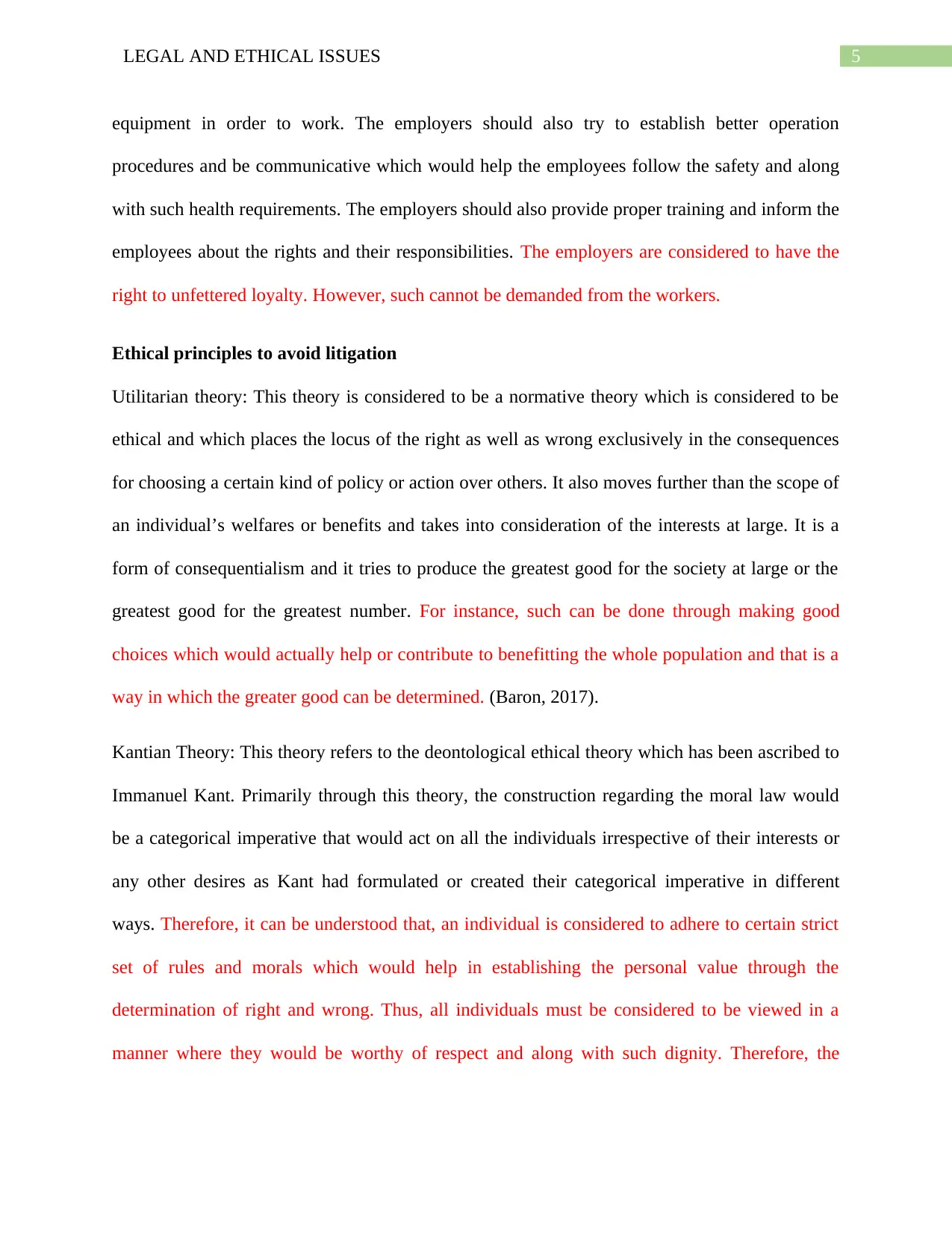
5LEGAL AND ETHICAL ISSUES
equipment in order to work. The employers should also try to establish better operation
procedures and be communicative which would help the employees follow the safety and along
with such health requirements. The employers should also provide proper training and inform the
employees about the rights and their responsibilities. The employers are considered to have the
right to unfettered loyalty. However, such cannot be demanded from the workers.
Ethical principles to avoid litigation
Utilitarian theory: This theory is considered to be a normative theory which is considered to be
ethical and which places the locus of the right as well as wrong exclusively in the consequences
for choosing a certain kind of policy or action over others. It also moves further than the scope of
an individual’s welfares or benefits and takes into consideration of the interests at large. It is a
form of consequentialism and it tries to produce the greatest good for the society at large or the
greatest good for the greatest number. For instance, such can be done through making good
choices which would actually help or contribute to benefitting the whole population and that is a
way in which the greater good can be determined. (Baron, 2017).
Kantian Theory: This theory refers to the deontological ethical theory which has been ascribed to
Immanuel Kant. Primarily through this theory, the construction regarding the moral law would
be a categorical imperative that would act on all the individuals irrespective of their interests or
any other desires as Kant had formulated or created their categorical imperative in different
ways. Therefore, it can be understood that, an individual is considered to adhere to certain strict
set of rules and morals which would help in establishing the personal value through the
determination of right and wrong. Thus, all individuals must be considered to be viewed in a
manner where they would be worthy of respect and along with such dignity. Therefore, the
equipment in order to work. The employers should also try to establish better operation
procedures and be communicative which would help the employees follow the safety and along
with such health requirements. The employers should also provide proper training and inform the
employees about the rights and their responsibilities. The employers are considered to have the
right to unfettered loyalty. However, such cannot be demanded from the workers.
Ethical principles to avoid litigation
Utilitarian theory: This theory is considered to be a normative theory which is considered to be
ethical and which places the locus of the right as well as wrong exclusively in the consequences
for choosing a certain kind of policy or action over others. It also moves further than the scope of
an individual’s welfares or benefits and takes into consideration of the interests at large. It is a
form of consequentialism and it tries to produce the greatest good for the society at large or the
greatest good for the greatest number. For instance, such can be done through making good
choices which would actually help or contribute to benefitting the whole population and that is a
way in which the greater good can be determined. (Baron, 2017).
Kantian Theory: This theory refers to the deontological ethical theory which has been ascribed to
Immanuel Kant. Primarily through this theory, the construction regarding the moral law would
be a categorical imperative that would act on all the individuals irrespective of their interests or
any other desires as Kant had formulated or created their categorical imperative in different
ways. Therefore, it can be understood that, an individual is considered to adhere to certain strict
set of rules and morals which would help in establishing the personal value through the
determination of right and wrong. Thus, all individuals must be considered to be viewed in a
manner where they would be worthy of respect and along with such dignity. Therefore, the
⊘ This is a preview!⊘
Do you want full access?
Subscribe today to unlock all pages.

Trusted by 1+ million students worldwide
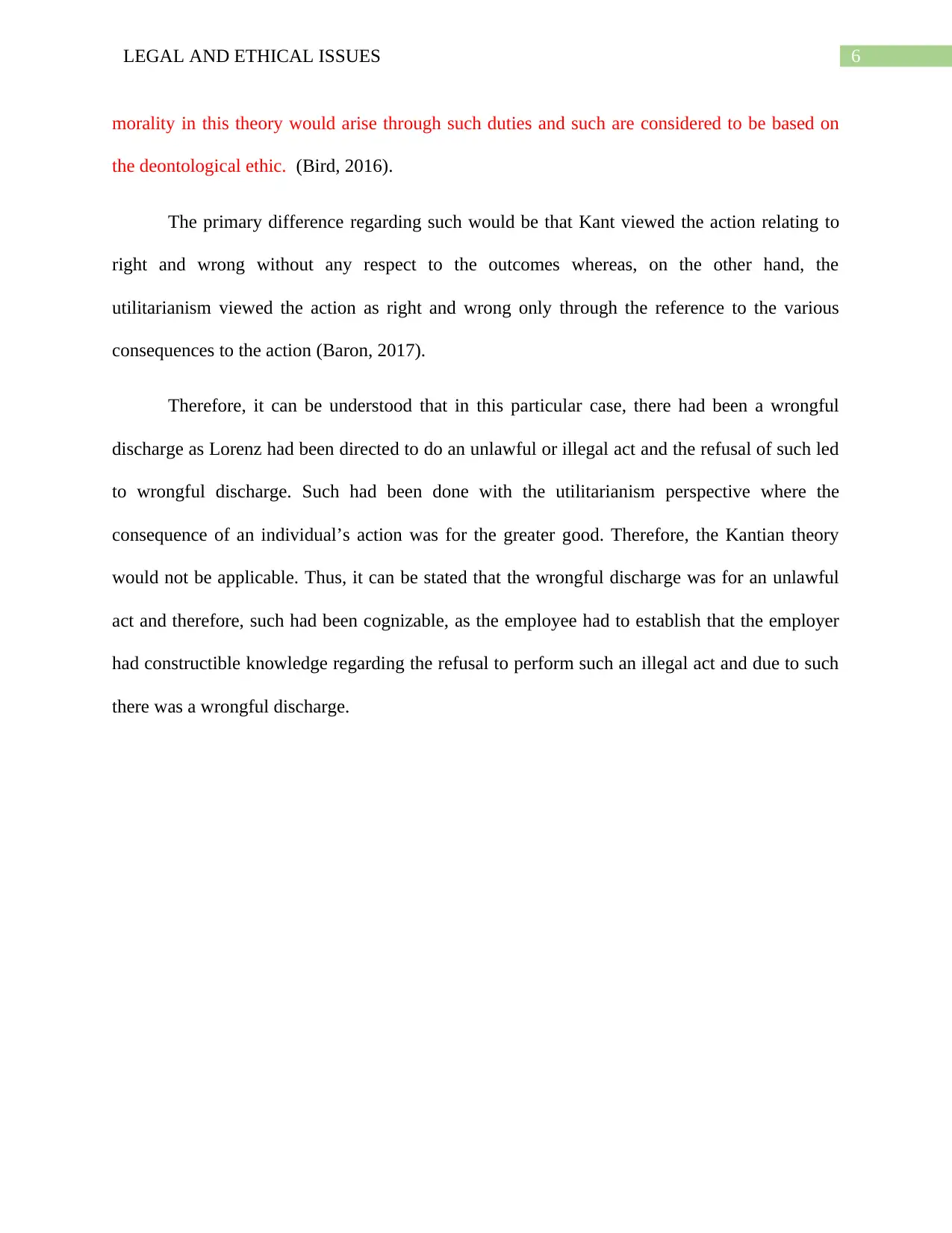
6LEGAL AND ETHICAL ISSUES
morality in this theory would arise through such duties and such are considered to be based on
the deontological ethic. (Bird, 2016).
The primary difference regarding such would be that Kant viewed the action relating to
right and wrong without any respect to the outcomes whereas, on the other hand, the
utilitarianism viewed the action as right and wrong only through the reference to the various
consequences to the action (Baron, 2017).
Therefore, it can be understood that in this particular case, there had been a wrongful
discharge as Lorenz had been directed to do an unlawful or illegal act and the refusal of such led
to wrongful discharge. Such had been done with the utilitarianism perspective where the
consequence of an individual’s action was for the greater good. Therefore, the Kantian theory
would not be applicable. Thus, it can be stated that the wrongful discharge was for an unlawful
act and therefore, such had been cognizable, as the employee had to establish that the employer
had constructible knowledge regarding the refusal to perform such an illegal act and due to such
there was a wrongful discharge.
morality in this theory would arise through such duties and such are considered to be based on
the deontological ethic. (Bird, 2016).
The primary difference regarding such would be that Kant viewed the action relating to
right and wrong without any respect to the outcomes whereas, on the other hand, the
utilitarianism viewed the action as right and wrong only through the reference to the various
consequences to the action (Baron, 2017).
Therefore, it can be understood that in this particular case, there had been a wrongful
discharge as Lorenz had been directed to do an unlawful or illegal act and the refusal of such led
to wrongful discharge. Such had been done with the utilitarianism perspective where the
consequence of an individual’s action was for the greater good. Therefore, the Kantian theory
would not be applicable. Thus, it can be stated that the wrongful discharge was for an unlawful
act and therefore, such had been cognizable, as the employee had to establish that the employer
had constructible knowledge regarding the refusal to perform such an illegal act and due to such
there was a wrongful discharge.
Paraphrase This Document
Need a fresh take? Get an instant paraphrase of this document with our AI Paraphraser
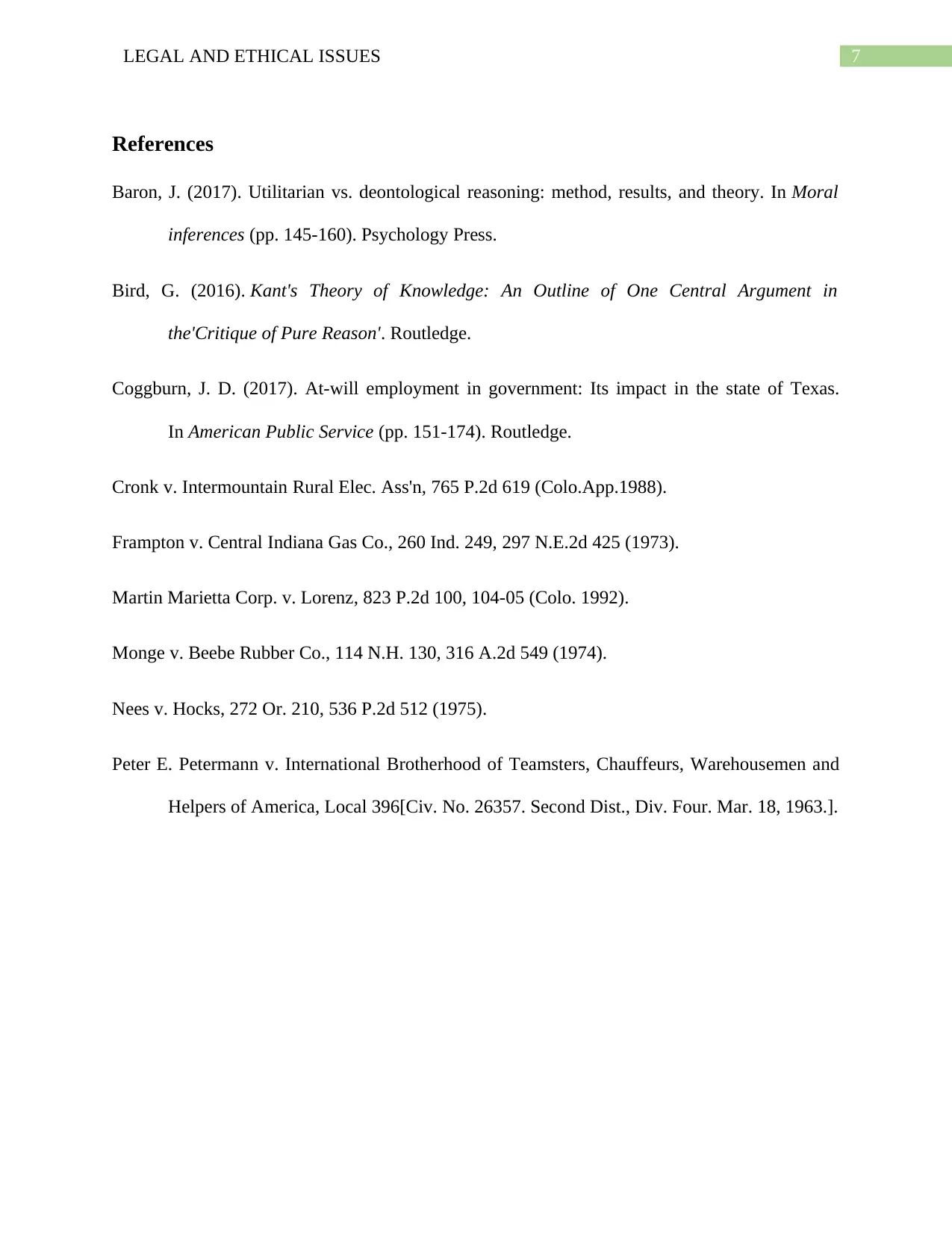
7LEGAL AND ETHICAL ISSUES
References
Baron, J. (2017). Utilitarian vs. deontological reasoning: method, results, and theory. In Moral
inferences (pp. 145-160). Psychology Press.
Bird, G. (2016). Kant's Theory of Knowledge: An Outline of One Central Argument in
the'Critique of Pure Reason'. Routledge.
Coggburn, J. D. (2017). At-will employment in government: Its impact in the state of Texas.
In American Public Service (pp. 151-174). Routledge.
Cronk v. Intermountain Rural Elec. Ass'n, 765 P.2d 619 (Colo.App.1988).
Frampton v. Central Indiana Gas Co., 260 Ind. 249, 297 N.E.2d 425 (1973).
Martin Marietta Corp. v. Lorenz, 823 P.2d 100, 104-05 (Colo. 1992).
Monge v. Beebe Rubber Co., 114 N.H. 130, 316 A.2d 549 (1974).
Nees v. Hocks, 272 Or. 210, 536 P.2d 512 (1975).
Peter E. Petermann v. International Brotherhood of Teamsters, Chauffeurs, Warehousemen and
Helpers of America, Local 396[Civ. No. 26357. Second Dist., Div. Four. Mar. 18, 1963.].
References
Baron, J. (2017). Utilitarian vs. deontological reasoning: method, results, and theory. In Moral
inferences (pp. 145-160). Psychology Press.
Bird, G. (2016). Kant's Theory of Knowledge: An Outline of One Central Argument in
the'Critique of Pure Reason'. Routledge.
Coggburn, J. D. (2017). At-will employment in government: Its impact in the state of Texas.
In American Public Service (pp. 151-174). Routledge.
Cronk v. Intermountain Rural Elec. Ass'n, 765 P.2d 619 (Colo.App.1988).
Frampton v. Central Indiana Gas Co., 260 Ind. 249, 297 N.E.2d 425 (1973).
Martin Marietta Corp. v. Lorenz, 823 P.2d 100, 104-05 (Colo. 1992).
Monge v. Beebe Rubber Co., 114 N.H. 130, 316 A.2d 549 (1974).
Nees v. Hocks, 272 Or. 210, 536 P.2d 512 (1975).
Peter E. Petermann v. International Brotherhood of Teamsters, Chauffeurs, Warehousemen and
Helpers of America, Local 396[Civ. No. 26357. Second Dist., Div. Four. Mar. 18, 1963.].
1 out of 8
Related Documents
Your All-in-One AI-Powered Toolkit for Academic Success.
+13062052269
info@desklib.com
Available 24*7 on WhatsApp / Email
![[object Object]](/_next/static/media/star-bottom.7253800d.svg)
Unlock your academic potential
Copyright © 2020–2026 A2Z Services. All Rights Reserved. Developed and managed by ZUCOL.





